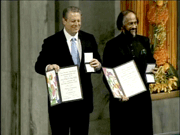The agencies and staff of the United Nations work tirelessly to create a more peaceful world. In recognition of their significant contributions, UN agencies and staff have received the Nobel Peace Prize multiple times.
In 2007, the Intergovernmental Panel on Climate Change received the Nobel Peace Prize for their work on building and disseminating information about man-made climate change. The IPCC is a scientific intergovernmental body established in 1988 by the World Meteorological Organization (WMO) and by the United Nations Environment Programme (UNEP). IPCC is comprised of more than 2,000 climate experts from over 100 countries. Their role is to assess scientific, technical and socio-economic information relevant to the understanding of climate change, evaluate its potential consequences, and provide options for adaptation and mitigation (UNEP, 2008).The former United States Vice-President and eminent environmentalist Mr. Albert Arnold (Al) Gore Jr. shared the award with the IPCC. The Norwegian Nobel committee chose to honour Mr. Gore and the IPCC with the Nobel Prize because both were 'seeking to contribute to a sharper focus on the processes and decisions that appear to be necessary to protect the world’s future climate, and thereby to reduce the threat to the security of mankind." (The Nobel Peace Prize, 2007)
The first Nobel Peace Prize awarded to a United Nations staff member was presented to Ralph Bunche in 1950. Ralph Bunche was a United Nations mediator in Palestine during the 1948 conflict between the Arabs and Jews. At the Nobel lecture Ralph Bunche said, "there are some in the world who are prematurely resigned to the inevitability of war....The objective of any who believe in peace clearly must be to exhaust every honourable recourse in the effort to save the peace." Four years later, Dr. G. J. van Hueven Goedhart, the United Nations High Commissioner for Refugees (UNHCR), received the UN's second Nobel Peace Prize for his tireless efforts to protect and support refugees. He said, "There can be no real peace in the world as long as hundreds of thousands of men, women and children ....still remain in camps and live in misery..."
UN staff and agencies received five Nobel Peace Prizes in the sixties and eighties. In 1961 the prize was awarded posthumously to Dag Hammarskjold, the Second Secretary General of the United Nations for his contributions to the UN's development. Four years later, the United Nations Children's Fund (UNICEF) received the prize for proving that "compassion knows no national boundaries." The Nobel Peace Prize was awarded in 1969 to The International Labor Organization (ILO). The Norwegian Nobel Committee chose the ILO because the organization's integral role in creating a more just world. The Nobel Committee justified their choice by explaining, 'if you desire peace, cultivate justice." More than a decade later, the Nobel Peace Prize was awarded to The Office of the United Nations High Commissioner for Refugees for, "...carrying out work of major importance to assist refugees, despite the many political difficulties with which it has to contend." Finally, in 1988, The United Nations Peacekeeping Forces received the award for reducing tensions in volatile situations.
More recently, the Nobel Peace Prize was awarded to The United Nations itself in conjunction with Kofi Annan, the UN Secretary-General from 1997-2006. The Norwegian Nobel Committee explained that the UN "is at the forefront of efforts to achieve peace and security in the world." In 2005 The International Atomic Energy Agency (IAEA) and its director General Mohammed ElBaradei received the award for "...their efforts to prevent nuclear energy from being used for military purposes and to ensure that nuclear energy for peaceful purposes is used in the safest possible way."
This multitude of Nobel Peace Prizes is evidence of the UN's deep commitment to world peace. The awards chronicle the feats of the many dedicated UN staff who continue to work towards building a better world for all.
Intergovernmental Panel on Climate Change (UNEP) (2008)
Retrieved on June 25, 2008, from http://www.ipcc.ch/
Pachauri, R.K. (2007, December). Nobel Lecture. Speech presented at City Hall in Oslo.
Retrieved on June 22, 2008, from http://nobelprize.org/nobel_prizes/peace/laureates/2007/ipcc-lecture_en.html
Article by Brianna Avenia Tapper
Click for printable version of this reading passage
Click for printable version of earlier version reading passage by Seo Yoon Chang
Reading Comprehension
exercise
Class
interactive activity |





